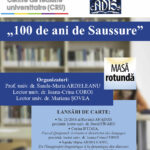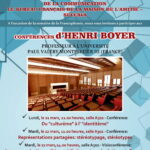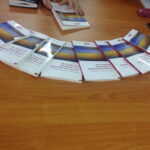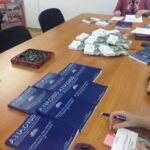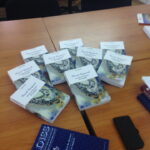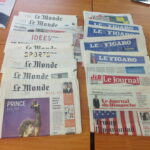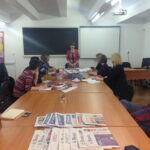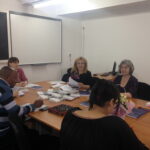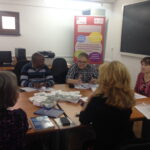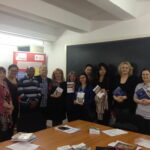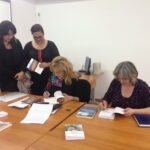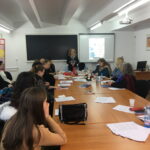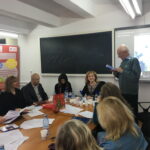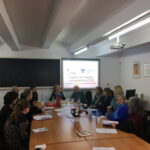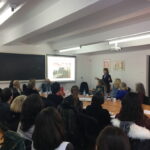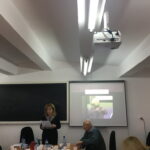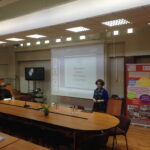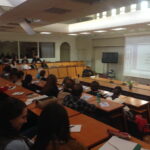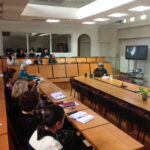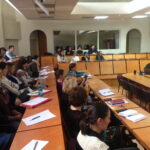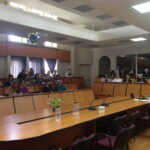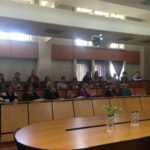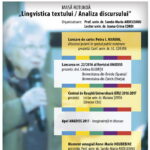On December 15, 2016, the University Success Center (URC) hosted the Round Table on “Text Linguistics / Discourse Analysis”. Organized by prof.univ.dr. Sanda-Maria Ardeleanu and lecturer univ.dr. Ioana-Crina Coroi, the event brought together a large number of professors, PhD students and students from “Ștefan cel Mare” University who actively and constantly participate in scientific and cultural events that both CADISS members and CRU collaborators propose.
Anchored in the main theme of CADISS research in 2016, the Round Table was a good opportunity to celebrate the publication of the book entitled Discursul puterii în spațiul public românesc (Discourse of Power in the Romanian Public Space), which Dr. Petru I. Marian, lecturer, recently published at Casa Cărții Cărții de Știința in Cluj-Napoca. Prof. I.C. Corjan presented the work in a laudatory way, inviting the audience to a careful reading of the book, since it “offers very valuable research tracks”.
No.22/2016 of the ANADISS journal, published by the Publishing House of the University of Suceava, under the coordination of Prof. Johannes Kabatek, Prof. Johannes Kabatek, Prof. Dorel Fînaru, joined by Dr. Cristina Bleorțu from the Universities of Oviedo (Spain) and Zürich (Switzerland), was presented with great professionalism and in detail by the young researcher, both by illustrating the theoretical thematic of the publication, and by emphasizing the important aspects revealed by the 18 articles published by researchers from the (inter)national academic space in the pages of the journal.
Ms. Mariana Șovea, lecturer, then illustrated, by providing pictures and punctual information, all types of activities carried out under the aegis of CRU in 2016 – book launches, meetings with Romanian and foreign students, conferences on various topics, etc. The Round Table “Linguistics of Text / Discourse Analysis” ended with an extremely moving moment dedicated by Prof. Sanda-Maria Ardeleanu to the tribute to Prof. Anne-Marie Houdebine, who recently passed away. She spoke with great dedication about the immense legacy left by the French linguist in all fields of human and social sciences, emphasizing the innovative ideas and remarkable research that continue to constitute true models of investigation of the linguistic imaginary.
As a sign of high respect and deep esteem for Prof. Houdebine, the members of CADISS have launched the Call for Papers in the next two issues of Anadiss (2017), with a research theme strongly anchored in the living presence of two defining concepts for language sciences: “Imaginaire(s) et discours”.
Remember Ferdinand de Saussure
Rare are the keywords in today’s linguistics which, like many other lines of research, do not have their source in Ferdinand de Saussure’s Course of General Linguistics. Synchronicity, diachrony, idiosynchronic, language, language, speech, sign, signified, signifier, linguistic unit, syntagma, syntagmatic, phoneme, phonology, linguistic substance, linguistic form, linguistic economy, linguistic value, code, pattern, model, semiology, sem, sem, opposition, oppositional, oppositional, relative, chain, structure, system…. and the list goes on.
The historical trend in linguistics (COȘERIU, WARTBURG, PAGLIARO, DEVOTO, TERRACINI), the sociological trend/orientation (MEILLET, VENDRYES, SOMMERFELT, COMEN), glossemantics, the Prague School (JAKOBSON, GODEL) and structuralist phonology, functionalism (Henri FREY, André MARTINET), generative-transformational grammar (HARRIS, CHOMSKY, HJLEMSLEV), structuralism and theories of enunciation (GUILLAUME, BENVENISTE), the psychology of language (OSGOOD, BRESSON), applied linguistics (HALLIDAY), sociology (Marcel MAUSS) and anthropology (Claude LÉVI-STRAUSS), philosophy (BÜHLER, CROCE), mathematical linguistics (MANDELBROT, HERDAN) … and the list of Saussurian-inspired theoretical currents can go on up to the linguistic imaginary, strongly represented in the Sucevian School.
This huge legacy, which is, in fact, the influence of Saussure’s Course in General Linguistics (1916) on scholars in various fields, illustrates, first of all, the power to impose a scientific behavior in linguistics, within which “every thesis is a hypothesis and every hypothesis is a thesis” (cf. Darwin).
And for these marvelous facts alone, we cannot avoid Saussure. At the age of 21, he produced the most beautiful book on historical linguistics ever written, Mémoire sur les voyelles primitives dans les langues indo-européennes, and also the “linguists’ bible”, the CLG, thanks to his successors, Bally and Sechelaye.
“100 years of Saussure” now means recognizing the need to continue the man who, at the age of 23, after a semester at the Sorbonne, inaugurated comparative grammar as a new discipline in French universities.
“Consciousness of the absolute individuality of the speech act”, “speech acts and their psychological or phonetic substance”, “language, made up of substance and form”, “the relations between language and speech”, “the definition of the sign”, “minimal units / monem, lexem, syntagma’, ‘the classification of semiological systems’, ‘the arbitrariness of the sign’, ‘the systemic character of language’, these are all Saussurean ideas which demonstrate that Saussure’s teaching, Saussure’s ‘school’, opens up new and new perspectives. Saussure’s thought remains at the center of numerous theoretical axes in anthropology, historical sciences, semiotics, linguistics.
Press release
International Day of La Francophonie celebrated at the French Office
For the 5th consecutive year, the International Day of La Francophonie is celebrated at the French Office, in the presence of prominent guests. This year all francophones and francophiles from Suceava are invited on Wednesday, March 23, at 5 pm, at the French Office in the Casa Prieteniei to meet and listen to Henri Boyer, professor at the University Paul Valéry Montpellier III in France. He is coming to Suceava, especially to celebrate together the International Day of Francophonie, at the invitation of Prof. Univ. DHC Sanda-Maria Ardeleanu, President of the Delegation of the Romanian Parliament to the Parliamentary Assembly of the Francophonie, and the title he proposes for his Conference at the French Office is Français, France, Francophonie: une trilogie à revisiter.
The conference will be followed by an artistic program coordinated by Prof. Tamara Sabin and offered by students from Suceava’s National College “Mihai Eminescu”, Secondary School “Miron Costin”, National College of Informatics “Spiru Haret” and Art College “Ciprian Porumbescu”, as a result of the partnership that the French Office has with the County School Inspectorate of Suceava, in organizing the event.The program of Professor Henri Boyer in Suceava also includes a series of lectures that he will give at the “Stefan cel Mare” University of Suceava:
– Monday, March 21, 11:00, room A302, Conference Du “culturème” à l’ “identitème”
-Tuesday, March 22, 11:00, room A302, Conference Représentations partagées: stéréotypage, stéréotypes
– Tuesday, March 22, 14:00, room A302, Videoconference: La communication politico-médiatique et ses évolutions en France. Les “petites phrases”.
At the same time, we mention that Professor Henri Boyer will participate on Wednesday, March 23, starting at 11 am, at the inauguration of the University Success Center of the “Stefan cel Mare” University, and on Thursday he will visit the museum-community Ciocănești, designated Cultural Village of Romania in 2014 and 2016, within a program organized by the Association of the Most Beautiful Villages in Romania (ACFSR), under the patronage of the French Embassy in Romania and the Wallonie – Brussels Delegation in Bucharest.
Linkuri din presă:
http://suceavalive.ro/ziua-internationala-francofoniei-celebrata-la-biroul-francez/

